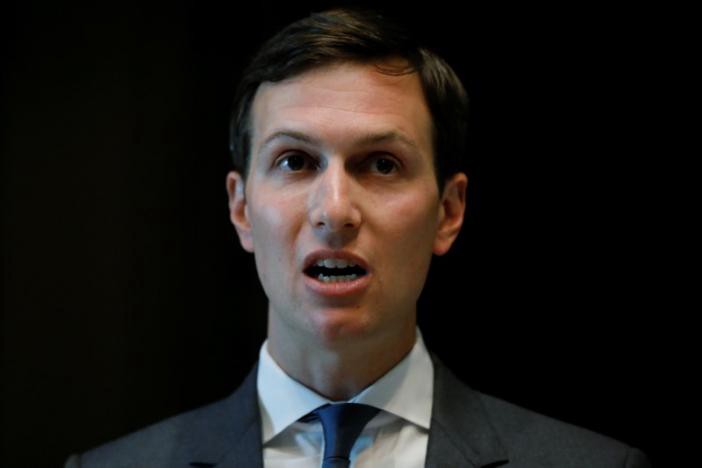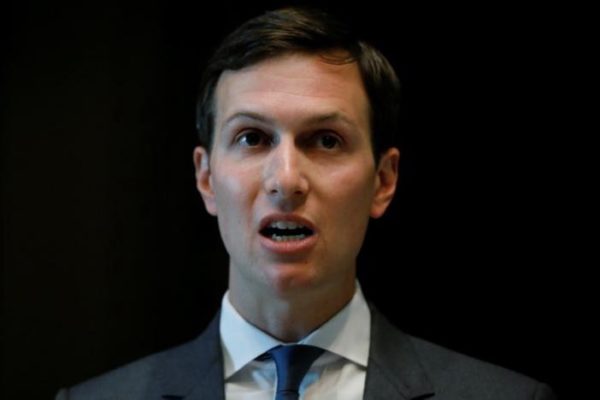Jared Kushner’s family business appears poised to capitalize on a provision of the $2.2 Trillion relief bill allowing owners of low-to-moderate income housing to temporarily freeze mortgage payments.That Kushner may also be able to benefit from his “shadow” coronavirus task force’s handling of the crisis is concerning, of course. But then again, the fact that he is involved at all in the federal government’s pandemic response, let alone helping to lead it, is alarming beyond measure. With no real qualifications, other than being married to Ivanka Trump, Kushner has already proved wildly overmatched by the comically-large portfolio his father-in-law entrusted to him, which has included trying to solve the Israeli-Palestinian conflict. He’s now blundering his way through the coronavirus crisis.

BY ERIC LUTZ
In theory, the sweeping coronavirus rescue package passed by Congress and signed by the president last week was not supposed to benefit Donald Trump or anyone else in his family and their businesses. But according to a Politico analysis of the 880-page, $2 trillion legislation, Jared Kushner’s family business appears poised to capitalize on a provision of the relief bill allowing owners of low-to-moderate income housing to temporarily freeze mortgage payments. Kushner’s family real estate firm owns thousands of such units, and in exchange for agreeing not to evict tenants who can’t pay rent during the coronavirus crisis, would be able to receive federal assistance with its mortgage payments—even if it has the cash to cover them. “Could he take advantage of it?” Shekar Narasimhan, an expert in real estate financing and managing partner of Beekman Advisors, told Politico. “Yes, his company could.”
That the president’s son-in-law, who has taken a starring role in Trump’s coronavirus response theater, can benefit from the historic rescue bill speaks both to some of the shortcomings of the Senate deal and to the unchecked conflicts of interest that fester within the Trump administration. Trump himself is obviously the standard bearer when it comes to profiting off his presidency, but Kushner is no slouch himself; his long list of apparent White House grifts now seems to include tapping a health insurance firm his brother co-founded to create a government website like the one his father-in-law said last month was nearing completion with help from Google.
On March 13, Trump promised the site would allow users to type in their symptoms and “determine whether a test is warranted and to facilitate testing at a nearby convenient location.” As the Atlantic reported, that wasn’t true—but Oscar Health, a company linked to Kushner, was hired quickly after to build such a site. It was ultimately scrapped, but it seemed like yet another instance of the first family mixing personal business with state business. “It’s not typical,” Jessica Tillipman, an assistant dean at the George Washington University School of Law, told the Atlantic. “It’s usually not allowed.”
That Kushner may be able to benefit from his “shadow” coronavirus task force’s handling of the crisis is concerning, of course. But then again, the fact that he is involved at all in the federal government’s pandemic response, let alone helping to lead it, is alarming beyond measure. With no real qualifications, other than being married to Ivanka Trump, Kushner has already proved wildly overmatched by the comically-large portfolio his father-in-law entrusted to him, which has included trying to solve the Israeli-Palestinian conflict. He’s now blundering his way through the coronavirus crisis.
In the crucial weeks when the Trump could have been preparing to combat the COVID threat, Kushner was telling the president that the media was blowing the whole thing out of proportion. When it became clear that it actually was a real threat, one that will likely define an era, the senior adviser brushed off the error and again inserted himself into the proceedings—establishing his own task force to address the crisis, adding an additional layer of confusion onto an already deeply chaotic White House response, according to the New York Times.
Many in Trump’s orbit are unqualified for their roles. What makes Kushner so uniquely embarrassing is his apparent belief that he actually is, that he somehow knows better than everyone else. “I have all this data about ICU capacity,” Kushner said in a recent White House meeting, a source told my colleague Gabriel Sherman. “I’m doing my own projections, and I’ve gotten a lot smarter about this. New York doesn’t need all the ventilators” it requested. This absurd overconfidence in his own abilities would almost be funny were it not for the influence he has with the president, who has adopted his son-in-law’s assessment of New York’s dire resource shortage: “I don’t believe you need 40,000 or 30,000 ventilators,” Trump repeated to Sean Hannity late last month.
Kushner “really sees himself as a disruptor,” American Oligarchs author Andrea Bernstein told the New York Times’ Michelle Goldberg on Thursday. “He had supreme confidence in his own abilities and his own judgment even when he didn’t know what he was talking about.” That was on full-display Thursday when he made his debut at the daily White House coronavirus briefing.
worst lollapalooza lineup of all time pic.twitter.com/9hnpkHxyJR
— Aaron Rupar (@atrupar) April 2, 2020
After repeating the word “data” over and over again for a few minutes, Kushner proceeded to talk down to the governors taking action to address the crisis, suggesting they “don’t know what’s in their state” and that he knows better what their needs are. “The notion of the federal stockpile was it’s supposed to be our stockpile,” Kushner said. “It’s not supposed to be states’ stockpiles that they then use.” The “our stockpile” remark drew immediate pushback. “The federal stockpile is reserved for all Americans living in our states, not just federal employees,” Representative Ted Lieu responded. “Get it?” Kushner almost certainly does not, of course—but that hasn’t stopped him before.
UPDATE : President Donald Trump has effectively removed the inspector general set to monitor spending from the $2 trillion coronavirus stimulus package, the latest move to curb oversight efforts over the massive government coronavirus crisis relief measure.
Glenn Fine, the acting Department of Defense inspector general, was set to lead the Pandemic Response Accountability Committee, the group of government watchdogs tasked with rooting out fraud and waste in coronavirus spending programs.
Trump in recent days has swiped at efforts to conduct oversight of the stimulus spending, and the role of inspectors general throughout government.
On Monday and Tuesday, he assailed a report released by the inspector general for the Department of Health and Human Services that highlighted the acute supply shortages at over 300 hospitals fighting the coronavirus outbreak across the country.
Vanity Fair


Leave a Reply
You must be logged in to post a comment.